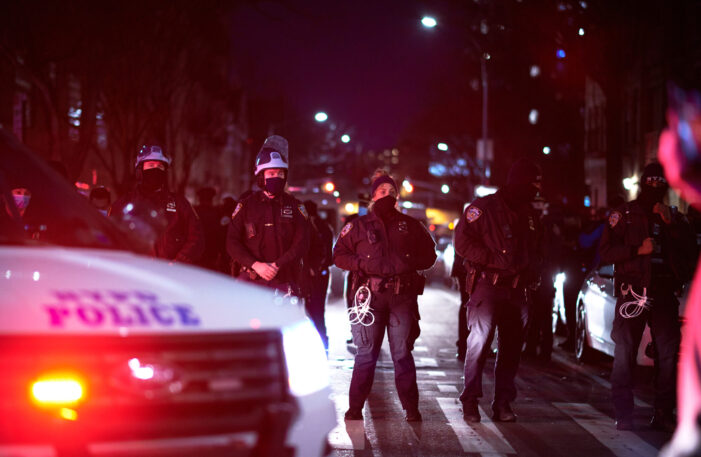New York City has agreed to pay more than $20,000 each to hundreds of individuals who were trapped by police and attacked with batons and pepper spray during a 2020 Black Lives Matter protest in the Mott Haven neighborhood of the Bronx.
According to documents filed in federal court on Tuesday evening, the city and the NYPD reached a proposed settlement to compensate anyone who was corralled by police during the infamous June 4 crackdown, which took place at the height of the protests against the police killing of George Floyd.
The settlement, which still must be approved by a judge, is believed to be the largest-ever per-person payout for a class action lawsuit arising from a mass arrest, according to Alison Frick, an attorney for the named plaintiffs who brought the class action lawsuit.
“It’s highly unusual,” said Martin Stolar, a civil rights attorney who is not involved in the case. “It shows me that the city is making an admission that there was substantial wrongdoing on the part of the department, and rather than going to trial where they risk judgment of a higher amount, they agreed to a settlement.”
Roughly 300 protesters were marching along 136th Street and Brook Avenue when they were blocked on both sides by walls of heavily-armored NYPD officers, a tactic known as kettling. Officers proceeded to attack the group with batons and pepper spray, before arresting an estimated 278 people. Among those trapped were medics, legal observers and journalists, including those reporting for Gothamist and WNYC who may be eligible for compensation.
A subsequent report from Human Rights Watch found cops acted “unprovoked and without warning, whaling their batons, beating people from car tops, shoving them down to the ground, and firing pepper spray in their faces.” The group accused the NYPD of “serious violations of international human rights law.” They described the police response, which was overseen by high-ranking department officials and primarily carried out by the NYPD’s controversial Strategic Response Group, as a “serious violation of international human rights law.”
On Wednesday, the City Council held a long-planned, repeatedly-delayed oversight hearing on the Strategic Response Group. No one from the NYPD showed up, citing ongoing litigation.
Under the terms of the settlement, anyone who was present for the kettling will be eligible to receive $21,500. An additional $2,500 will be awarded to each person who was arrested. The city is expected to pay an estimated $6 million to participants in the Mott Haven protest, in addition to attorney’s fees arising from the case.
Frick said the settlement is expected to be finalized by a judge in October, with victims likely receiving compensation before the end of the year.
“It was a pre-planned and premeditated assault,” Frick told Gothamist. “This is a historic settlement and we feel very confident the court will approve it.”
Emily Janakiram, a protester arrested in Mott Haven, described her reaction to the settlement as “shock and awe.” She recalled spending hours in a jail cell, surrounded by other protesters who were bloodied and bruised, wondering why they had been arrested for a peaceful demonstration..
“I’m glad to see there’s some kind of accountability being handed out,” she said. “But it’s bothersome that it’s being paid for by the taxpayer and it’s not coming out of the NYPD’s budget, which is what we were trying to draw attention to at the time.”
In an unattributed statement on Wednesday, the NYPD said the protest came during a “challenging moment for the department,” as officers attempted to balance demonstrators’ first amendment rights with what the agency referred to as “wide-scale rioting” and destruction.
The settlement does not include an admission of wrongdoing by the NYPD, whose leadership under former Mayor Bill de Blasio vigorously defended police actions on the night of the protest. On the day after the protest, former NYPD Commissioner Dermot Shea said the police response was “executed nearly flawlessly,” describing the protest leaders – including well-known Bronx community organizers – as “outside agitators.”
On Wednesday, though, the agency said it had “re-envisioned” its policies and training procedures around large-scale demonstrations after receiving recommendations from several outside agencies.
De Blasio and Shea did not immediately respond to requests for comment

